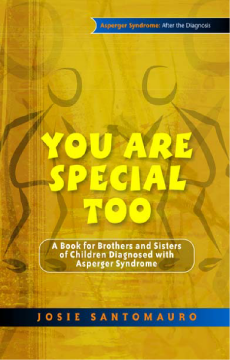
Additional Information
Book Details
Abstract
My brother gets extra help from a special teacher. He has temper tantrums when he is angry and sometimes finds it hard to pay attention. He has even been to a special school to learn how to behave appropriately in class. He might be a little different from others in some ways ... but my brother is NOT STUPID!'
This book offers a fun and accessible introduction for the sibling of a child diagnosed with Asperger Syndrome (AS).
Intended as a support tool in the initial period after diagnosis, You Are Special Too is varied and engaging, and addresses questions or concerns that the child might have, such as 'What's wrong with my brother?', 'Why has my sister got Asperger', and 'What about me?'.
Also included are poems, stories, illustration and activities to help them come to terms with and move forward from a sibling's diagnosis of AS.
You Are Special Too will be essential reading for children in the initial period after a sibling's diagnosis of AS.
Josie Santomauro is a full-time writer living in Brisbane, Australia. Her son, Damian, was diagnosed with AS at the age of five. She has written numerous fiction books for children and young adults, and several books on AS. She regularly gives seminars and talks on AS.
This companion booklet to "A Special Book About Me", is intended for siblings of children recently diagnosed with Asperger Syndrome, and as such, will be extremely useful for families... There are coping suggestions such as talking with a family member about feelings, keeping a diary, finding positive things to do that make one happy. There is even a certificate o fill in to prove that the reader is special too! This is an unusual and most useful approach to the problem of finding oneself with an AS sibling, and the black and white illustrations add to the emotional reading of the text.
Healthy Books
Table of Contents
| Section Title | Page | Action | Price |
|---|---|---|---|
| Chapter One: Introduction | |||
| Chapter Two: Theoretical Framework | |||
| Chapter Three: Methodology | |||
| Chapter Four: Participant Experiences | |||
| Chapter Five: Transformations | |||
| Chapter Six: Conclusion |
